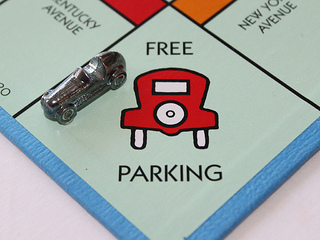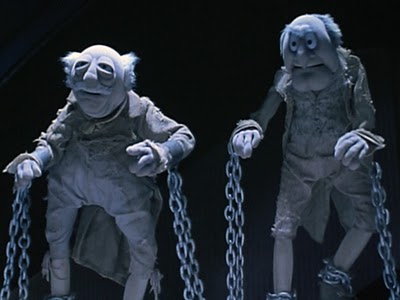When people think the of board games they played growing up, most people think of those designed for kids. These are games like Candy Land, Mouse Trap, or Chutes & Ladders. As we got a bit older we graduated to the “more adult” board games that were played around the house like Clue, or in the case of my family, Yahtzee…a lot of Yahtzee.
And then there’s Monopoly. While I never played Monopoly with my family, I remember a friend owning the game and us playing it fairly regularly Saturday afternoons. I was 14 or 15 at the time, and, like most people, we didn’t exactly follow all the rules. We house ruled what we wanted. We had money for Free Parking, there were no auctions, and you never were forced out of jail. We tried to read the rules once, but then it started getting into stuff about the auctions, and mortgaging (and how there’s a tax when you un-mortgage properties), and other crazy financial mumbo-jumbo. So we just made stuff up as we went along. Games would take hours, and I recall one friend who would never wheel-and-deal properties, always ultimately losing as a result. When you’re a kid, Monopoly is just some silly game with fake money and little tokens. Nobody takes it too seriously, and if things really aren’t getting anywhere, you eventually just give up, go outside, and play baseball or something.
Fast forward a decade or two, and one night you’re feeling ambitious. Or nostalgic. You get some friends together, dust off the old Monopoly box, and decide to give it another try. This time, you actually read the rules. You auction properties when a player doesn’t want to buy it? Free Parking literally does nothing?
After learning how to play the game the real way, the game progresses along. After two hours of your friends refusing to trade without paying ludicrous amounts of money, someone finally gets fed up, flips a table, and just like that your friendships are shattered for a lifetime. And it’s all Monopoly’s fault.
Ok, so that’s not how it generally happens, but many people choose to remember it that way, and as a result Monopoly gets a bad rap. This isn’t to say that Monoply is a good game by today’s standards, but if you go by the written rules, Monopoly isn’t quite as terrible as you remember it to be. That is, so long as you accept a few truths when playing a game of it.
#1. Roughly 75% of your chances for success are based solely on dice rolls
Without getting too technical about the math behind it (via a distribution chart for rolling 2d6 and the likelihood of certain numbers coming up), let’s just say that a lot of what happens to you in this game depends on what you happen to land on. Throw in the random effects of Chance or Community Chest cards, and you have an even more chaotic situation on your hands. There is nothing you can do to help land on certain spaces or not land on others. With a game like Settlers of Catan, you build a settlement on a land tile with an “8” knowing that it will be rolled more often than, say, a “3”. In Monopoly, you don’t get the luxury of looking for one instance of a roll within multiple rolls. This makes Monopoly arguably the most successful Roll And Move game ever. Sometimes you dodge a lofty rent cost, and sometimes you don’t. It all largely depends on the how the dice roll.
#2. You always have to give up something to get something
While it can happen on rare occasions, it’s hard to get all the properties of one color, or all the railroads/utilities, without trading with someone. If you’re lucky, you’ll have a good bargaining chip to trade with, but hey, sometimes you don’t. When you need that third orange property, the person you’re trading with might gouge you for it.
There’s a reason for that: monopolies are a game changer. While it may not seem fair that your friend will only trade that $200 property with you for $450 and two other properties, this is the nature of the game. There is no reward without risk, and you’ll have to take a lot of risk to get to the top. Sometimes that risk pays off, and sometimes it blows up in your face. Nevertheless, you have to gamble at times if you expect to succeed.
#3. Never trading is a recipe for failure
Don’t be a scrooge. In the grand scheme of things, you’re never going to win without engaging with other players. Architects, the one Archetype is neutral towards Monopoly, still has a hard time reconciling the fact that they can’t simply sit tight and ride the game out. (Most Archetypes overtly avoid Monopoly; only Daredevils can walk in and play the game for what it is and enjoy themselves without coaxing.)
Consider that everyone is making $200 every time they loop around the board. Most players will be making a profit on that. Ultimately, monopolies are how you start winning the game, and refusing to trade anything with anyone is just going to stall the game out. If you don’t make deals eventually people realize that you are not going to accommodate offers and will start trading with one another instead. This can put you in a bad position quickly. Without a big source of income for yourself, even some midrange property with two or three houses can lead to your swift demise. Monopoly is a microcosm of capitalism at work, and like real life, reward usually has risk. Even with your enemies. By acting like old Ebenezer and hoarding all your earnings / property, you may win short-term victories, but you may not last the entire game.
From a mechanics perspective, Monopoly isn’t great. The high factor of chance via dice rolls makes the game frustrating to deal with. Sometimes, the dice really don’t go your way, forever eliminating any possibility you had to win. Most people – with good reason – are turned off to Monopoly because this is the single least enjoyable aspect of the game, and it just happens to be the most prevalent mechanic.
With that said, the rest of the game actually stands on its own. The rules are well-defined for a game that was first published over a century ago, and there is method to all of the madness around it. The game provides the means of making a quick buck by selling buildings and mortgaging property, and the smaller attributes like paying a percentage of interest to remove that mortgage makes it a realistic mechanic with parallels to real-world economics.
Plus, let’s be honest here: nothing is more ridiculously satisfying than winning a multi-hour game of Monopoly with your friends, earning the right to shower yourself with all of your orange $500 bills.
Photo Credits: Free Parking by Philip Taylor; Fiji Water by Mike Willis; Marley Brothers by The Jim Henson Co..



